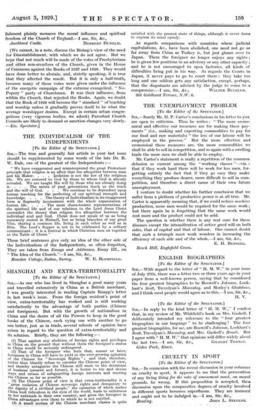SHANGHAI AND EXTRA-TERRITORIALITY [To the Editor of the SPECTATOR.]
SIR,—As one who has lived in Shanghai a good many years and travelled extensively in China as a British merchant, I was greatly interested in reading Captain Knapp's letter in last week's issue. From the foreign resident's point of view, extra-territoriality has worked and is still working satisfactorily to the advantage of both parties (Chinese and foreigners). But with the growth of nationalism in China and the desire of all the Powers to keep in the good books of the Chinese, each vying one with another to go one better, just as in trade, several schools of opinion have arisen in regard to the question of extra-territoriality and its solution. Briefly, they are the following :—
(1) That against any abolition of foreign rights and privileges in China on the ground that without them the foreigner's status in China would be seriously endangered.
(2) That of the foreigner who feels that, sooner or later, foreigners in China will have to yield to the ever-growing agitation of the Chinese for " Sovereign Rights " ; and that, therefore, rather than bluntly refuse to consider the Chinese point of view, and thereby antagonize the Chinese still more to the detriment of business (present and future), it is better to try and devise Ways and means of safeguarding foreign interests and meeting the Chinese as far as possible.
(3) The Chinese point of view is that extra-territoriality is a
gross violation of Chinese sovereign rights and derogatory to the dignity of a civilized people," the operation of which makes China look ridiculous in the eyes of the world, leads to unfairness to her nationals in their own country, and gives the foreigner in China advantages over them to which he is not entitled. (4) A small section of' the Chinese merchant cladsds is quite . _
satisfied with the present state of things, although it never dares to express its mind openly.
As regards comparisons with countries where judicial capitulations, &c., have been abolished, one need not go as far away from China as Turkey is, but just glance over to Japan. There the foreigner no longer enjoys any rights ; he is given few positions in an advisory or any other capacity ; and he is not encouraged to open factories, all kinds of difficulties being put in his way. As regards the Courts in Japan, it never pays to go to court there : they take too long and one seldom gets any satisfaction, except, perhaps, that the disputants are advised by the judge to come to a
compromise.—I am, Sir, &c., WALTER HUCHLER. 261 Goldhurst Terrace, N.W. 6.


































 Previous page
Previous page